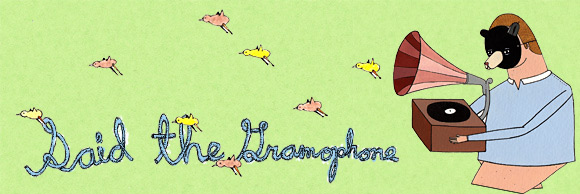The Soul Stirrers - "Until Then"
The Soul Stirrers stir the soul, sure, despite the dubious premise on which their music rests: that life on earth is but a meantime, an insignificant, if sometimes inhospitable, expanse on a road to blissful eternity. They do this with their voices - floating untethered from their mouths - and with their faith, which is neatly demonstrated by their modest wants: just that god give them the strength and courage to wait "until then," until they ascend off of this "sinful earth." If god does exist, these men must have his ear; and if not, well, they certainly have ours, thank god.
[Buy]
Richie Havens - "The Night They Drove Old Dixie Down"
The Band approaches "The Night They Drove Old Dixie Down" - a song about the sadness of the South in the final throes and aftermath of the Civil War - as if they themselves were the vanquished. Levon Helm plays drums and sings in character, as defeated and phlegmatic as he can manage without falling behind the tempo, which he constantly threatens to do. Richie Havens, on the other hand, slows the song down and drives through it with his powerful strumming. There's no wistfulness in Havens's telling of the South's defeat, but nor is there irony in his sympathetic portrayal of the song's Confederate protagonist. We might assume that Havens, a black Yankee, was pleased with the outcome of the Civil War, but in his steady hands and generous voice, "Dixie" is ungloating. More than that, it's an appreciation of the land and heat that still make up so much of his country.
[Buy]
My Morning Jacket - "If All Else Fails"
In many respects, My Morning Jacket have improved since their first album, 1999's The Tennessee Fire. The production on that album is muddled and scratchy, whereas their latest recording, this year's Evil Urges, is as perspicuous and loud as a bachelor is an unmarried man. On their first record, missed notes and wobbly tempos litter the songs, though neither fault is anywhere to be found on the band's latest. But as MMJ have honed their skills, progressed unrelentingly toward the realization of their vision - let's call it indie-arena-Southern-rock - casualties have been left in the wake. One such loss is that of tenderness, which can be heard so clearly - despite the dubious production - on this song from the band's debut. Listen, for instance, to the ritardando into the chorus, and then to the delicate step up as Jim James sings the song's title, his voice breaking up amid the ghostly reverberations of his bandmates' vocal backing.
[Buy]
Jerry Butler - "I'm A-Telling You"
Jerry Butler's not a-telling you anything you don't already know. The song's main refrain - "I'm a-tellin' you (whaaa)/I'm a-tellin' you" - sounds like a tautology, and the actual lyrics aren't much more informative. Butler presents a series of mundane gripes about the oppressiveness of capitalism, the work-a-day lifestyle, family responsibilities, etc., but manages to elevate these concerns from the prosaic to the epic. This is achieved in two ways: through Butler's theatrical, proto-soul vocals, which call to mind a deeper-voiced, less deep Sam Cooke; and, most of all, through guitar playing so sensitive, so unassumingly complementary, that you hardly notice it's there until someone asks you why you can't stop crying, why you won't answer the phone, why you haven't been to work in weeks, and you listen a little closer, discovering the answer: a skittering arpeggio on a quiet, warm guitar.
[Buy}
Henry Spaulding - "Cairo Blues"
There are at least eight Cairos in the United States. There's one in Georgia and one in Illinois, one in Missouri, Nebraska, Minnesota and New York. There's a Cairo in West Virginia and there's even one in Ohio, that nearly palindromically named place. Little is known about Henry Spaulding, an American blues musician active in the 1920s, so which of these Cairos is the subject of his song, and therefore which to avoid, is impossible to say (though from the exotic picture he paints of the town, it might as well be in Egypt). "Women of Cairo," Spaulding will have us believe, "treat you kind and strange." The kindness is but a ruse, it turns out, and the strangeness is something far worse than merely strange. They "kick you and knife you, beat you and cut you, too," he sings, before adding the temporal location of these offenses (and the only reason anyone might construe these belligerent women as kind): "when you're through." Still, Spaulding has a masochistic streak, and though he sings throughout of leaving, we're not sure whether he's leaving from or to Cairo, whether he's departing from or reuniting with his kind and strange Cairo baby.
[Buy]
Marvin Pontiac - "No Kids"
Amid the opacity and obfuscation, the grown-up eccentricity, the adult artsiness, non-rhyming verses, and then, when you least expect it, rhyming ones, a chorus that's not a chorus, and back-up singers who don't belong, there is a sad and stuttering guitar riff - perspicuous and lovely - and a bass line like scotch settling warmly in your chest. There is also a single moment of lyrical clarity, which, while revealing nothing directly about the otherwise obscure words, tidily captures the narrator's ambiguous feelings about childlessness: "I have no kids/to bother me when I'm sleeping/to sing goodnight to."
[Buy]
Hayden - "In Field and Town"
What's the difference between Hayden and Haydn other than an 'e' and two centuries? Both men are men (as all men are), both composers, both keyboardists. The sound of synthesizers, like the momentum of life, can sometimes seem backwards when in fact it is forwards. Mopey indie rock can be soul music, too.
[Buy]
|
about said the gramophone
This is a daily sampler of really good songs. All tracks are posted out of love. Please go out and buy the records.
To hear a song in your browser, click the  and it will begin playing. All songs are also available to download: just right-click the link and choose 'Save as...'
All songs are removed within a few weeks of posting.
Said the Gramophone launched in March 2003, and added songs in November of that year. It was one of the world's first mp3blogs.
If you would like to say hello, find out our mailing addresses or invite us to shows, please get in touch:
Montreal, Canada: Sean
Toronto, Canada: Emma
Montreal, Canada: Jeff
Montreal, Canada: Mitz
Please don't send us emails with tons of huge attachments; if emailing a bunch of mp3s etc, send us a link to download them. We are not interested in streaming widgets like soundcloud: Said the Gramophone posts are always accompanied by MP3s.
If you are the copyright holder of any song posted here, please contact us if you would like the song taken down early. Please do not direct link to any of these tracks. Please love and wonder.
"And I shall watch the ferry-boats / and they'll get high on a bluer ocean / against tomorrow's sky / and I will never grow so old again."
about the authors
Sean Michaels is the founder of Said the Gramophone. He is a writer, critic and author of the theremin novel Us Conductors. Follow him on Twitter or reach him by email here. Click here to browse his posts.
Emma Healey writes poems and essays in Toronto. She joined Said the Gramophone in 2015. This is her website and email her here.
Jeff Miller is a Montreal-based writer and zinemaker. He is the author of Ghost Pine: All Stories True and a bunch of other stories. He joined Said the Gramophone in 2015. Say hello on Twitter or email.
Mitz Takahashi is originally from Osaka, Japan who now lives and works as a furniture designer/maker in Montreal. English is not his first language so please forgive his glamour grammar mistakes. He is trying. He joined Said the Gramophone in 2015. Reach him by email here.
Site design and header typography by Neale McDavitt-Van Fleet. The header graphic is randomized: this one is by Matthew Feyld.
PAST AUTHORS
Dan Beirne wrote regularly for Said the Gramophone from August 2004 to December 2014. He is an actor and writer living in Toronto. Any claim he makes about his life on here is probably untrue. Click here to browse his posts. Email him here.
Jordan Himelfarb wrote for Said the Gramophone from November 2004 to March 2012. He lives in Toronto. He is an opinion editor at the Toronto Star. Click here to browse his posts. Email him here.
our patrons
search
Archives
elsewhere
our favourite blogs
(◊ means they write about music)
Back to the World
La Blogothèque ◊
Weird Canada ◊
Destination: Out ◊
Endless Banquet
A Grammar (Nitsuh Abebe) ◊
Ill Doctrine ◊
A London Salmagundi
Dau.pe ◊
Words and Music ◊
Petites planètes ◊
Gorilla vs Bear ◊
Herohill ◊
Silent Shout ◊
Clouds of Evil ◊
The Dolby Apposition ◊
Awesome Tapes from Africa ◊
Molars ◊
Daytrotter ◊
Matana Roberts ◊
Pitchfork Reviews Reviews ◊
i like you [podcast]
Musicophilia ◊
Anagramatron
Nicola Meighan ◊
Fluxblog ◊
radiolab [podcast]
CKUT Music ◊
plethoric pundrigrions
Wattled Smoky Honeyeater ◊
The Clear-Minded Creative
Torture Garden ◊
LPWTF? ◊
Passion of the Weiss ◊
Juan and Only ◊
Horses Think
White Hotel
Then Play Long (Marcello Carlin) ◊
Uno Moralez
Coming Up For Air (Matt Forsythe)
ftrain
my love for you is a stampede of horses
It's Nice That
Marathonpacks ◊
Song, by Toad ◊
In FocusAMASS BLOG
Inventory
Waxy
WTF [podcast]
Masalacism ◊
The Rest is Noise (Alex Ross) ◊
Goldkicks ◊
My Daguerreotype Boyfriend
The Hood Internet ◊
things we like in Montreal
eat:
st-viateur bagel
café olimpico
Euro-Deli Batory
le pick up
lawrence
kem coba
le couteau
au pied de cochon
mamie clafoutis
tourtière australienne
chez boris
ripples
alati caserta
vices & versa
+ paltoquet, cocoa locale, idée fixe, patati patata, the sparrow, pho tay ho, qin hua dumplings, café italia, hung phat banh mi, caffé san simeon, meu-meu, pho lien, romodos, patisserie guillaume, patisserie rhubarbe, kazu, lallouz, maison du nord, cuisine szechuan &c
shop:
phonopolis
drawn + quarterly
+ bottines &c
shows:
casa + sala + the hotel
blue skies turn black
montreal improv theatre
passovah productions
le cagibi
cinema du parc
pop pmontreal
yoga teacher Thea Metcalfe
(maga)zines
Cult Montreal
The Believer
The Morning News
McSweeney's
State
The Skinny
community
ILX
|





does that track have Sam Cooke up front? Or a different lead vocalist?
Oh yeah, that's Sam for sure.
that's not sam cooke.